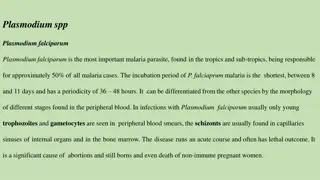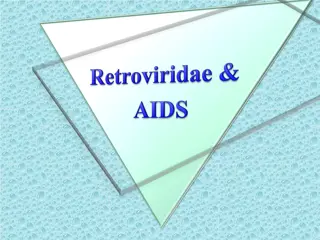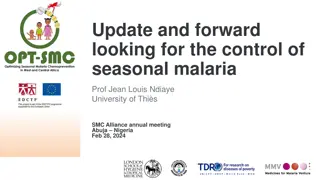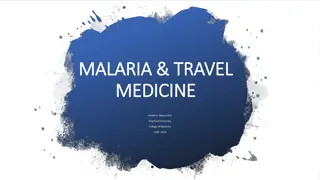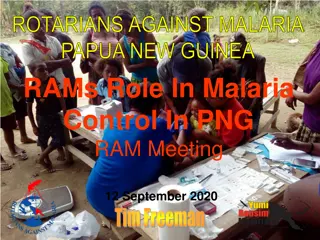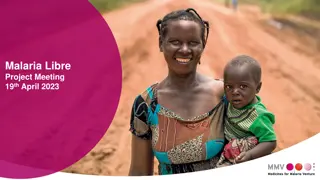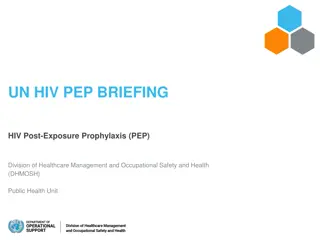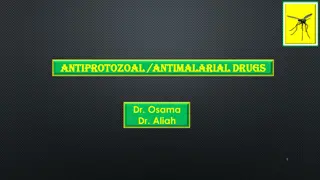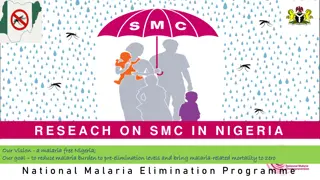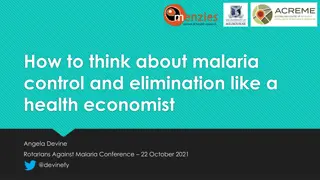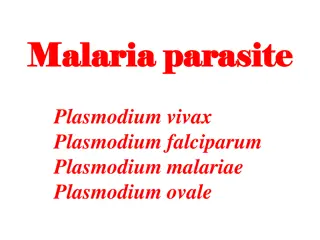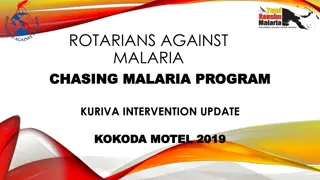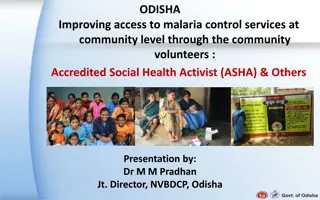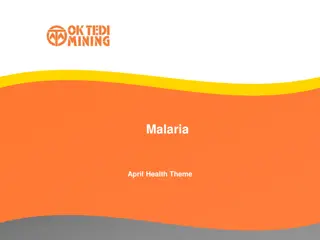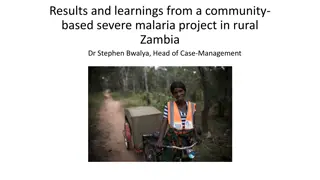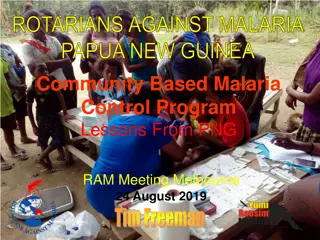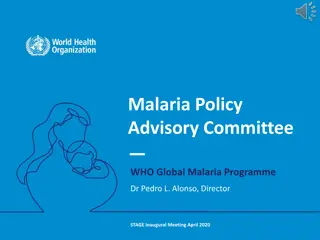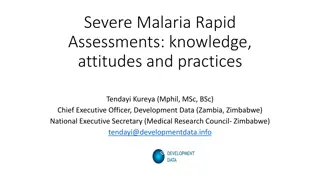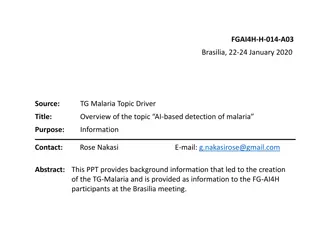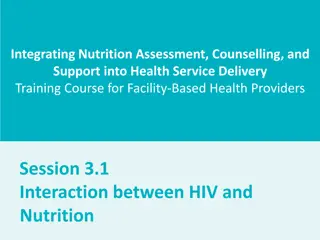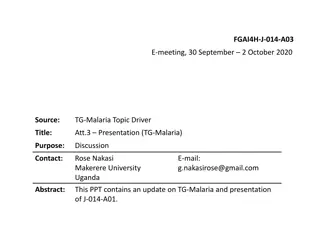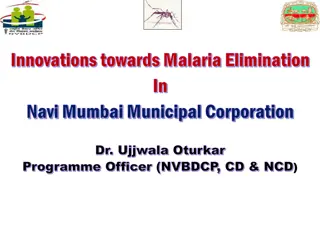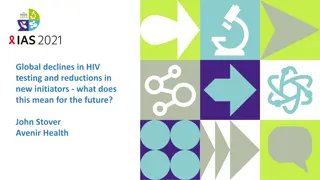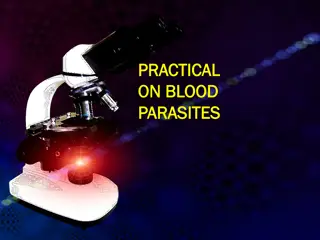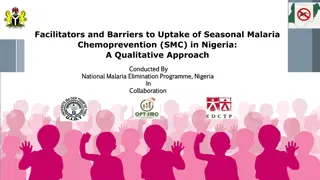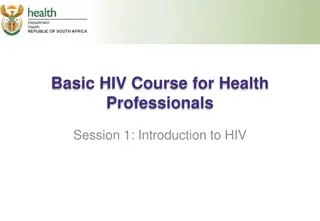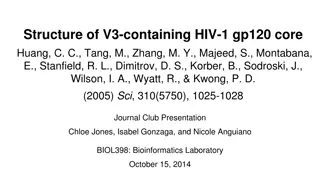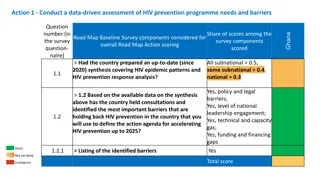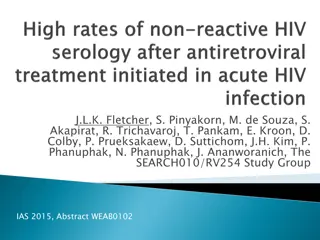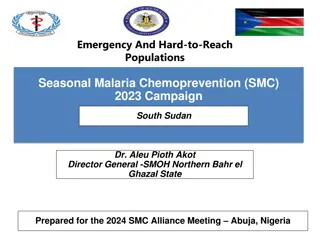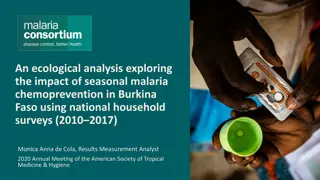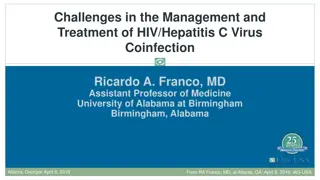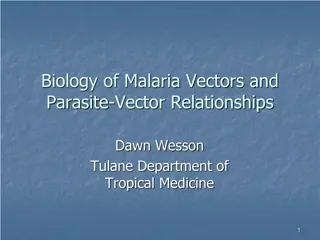Malaria Vaccines 101
Explore the complexities of malaria vaccine development, targeting Plasmodium species/stages, immunity evidence, and broad vaccine approaches focusing on sub-unit vaccines. Discover the quest for an effective and accessible malaria vaccine.
9 views • 32 slides
Optimizing MDA for Malaria Reduction in Senegal
Study on mass drug administration with dihydroartemisinin-piperaquine and primaquine in Senegal to reduce malaria transmission. Senegal's progress in malaria reduction, seasonal transmission, and comparison of SMC vs. MDA strategies. WHO recommendations and testing a hypothesis for sustainable impac
1 views • 30 slides
Malaria Libre open project meeting
The Malaria Libre Open Project Meeting scheduled for 25/01/2024 will feature updates from key project members including Dr. Diego Gonzalez Cabrera and Dr. Didier Leroy. The meeting will cover an introduction to Malaria Libre, project updates, and allow for any other business discussions. The project
0 views • 27 slides
Enhancing Malaria Services Access in South Sudan - Annual Meetings Summary
The Eastern and Southern National Malaria Programs, along with partners, conducted meetings in Uganda to address malaria service accessibility in South Sudan. The Malaria Matchbox initiative aimed to identify barriers and risk factors hindering equitable service provision, focusing on behavior, soci
0 views • 26 slides
Update on HIV and AIDS Prevention Guidelines 2022
This update highlights key points from the PMK No. 23/2022 on combating HIV, AIDS, and STIs. It covers terminologies, goals for eliminating HIV and AIDS by 2030, and strategies such as PrEP and PEP. The guidelines emphasize timely interventions like Post-Exposure Prophylaxis (PEP) and Pre-Exposure P
3 views • 38 slides
Overview of Plasmodium falciparum and Plasmodium vivax Malaria Parasites
Plasmodium falciparum is the most significant malaria parasite, responsible for about 50% of cases, with a short incubation period and distinct morphology in blood smears. It causes severe symptoms and complications, affecting various organs. In contrast, Plasmodium vivax is the most common malaria
2 views • 7 slides
Understanding the Differences Between HIV and AIDS, Importance of Prevention
HIV and AIDS are closely related, with HIV being the virus that leads to AIDS. HIV weakens the immune system by attacking specific white blood cells, while AIDS is the advanced stage of HIV infection. Prevention is crucial as AIDS is a deadly, incurable disease. The transmission of HIV primarily occ
4 views • 14 slides
Human Immunodeficiency Virus
HIV, a member of the lentivirus subfamily of retroviruses, causes Acquired Immunodeficiency Syndrome (AIDS). HIV-1 and HIV-2 have distinct characteristics, with HIV-1 being global and HIV-2 primarily in West Africa. The virus encodes reverse transcriptase and has an envelope containing glycoproteins
1 views • 31 slides
Strengthening Seasonal Malaria Control Initiatives in West Africa
Prof. Jean Louis Ndiaye leads a collaborative effort involving NMPs from various countries to optimize the effectiveness of Seasonal Malaria Chemoprevention (SMC). The project aims to enhance research priorities, conduct IR/OR projects, and promote inter-country collaboration to combat malaria in th
1 views • 13 slides
The Impact of Malaria Eradication Programs in Sub-Saharan Africa
Malaria, an infectious disease transmitted by mosquitoes, poses a significant threat in Sub-Saharan Africa where over half a billion people are affected annually. Despite various efforts including global eradication programs, the focus on prevention rather than treatment is deemed crucial to minimiz
0 views • 14 slides
Understanding Malaria & Travel: Epidemiology, Etiology, and Prevention
Exploring the epidemiology and etiology of malaria with a focus on travel-related risks. Educational objectives include gaining knowledge on malaria transmission, prevention strategies, and the importance of seeking medical advice before traveling to endemic areas.
0 views • 62 slides
Role of ROTARIANS AGAINST MALARIA (RAM) in Malaria Control in Papua New Guinea
ROTARIANS AGAINST MALARIA (RAM) plays a crucial role in malaria control in Papua New Guinea through various programs like net distribution, health facility supervision, and drug distribution. Funding from sources like the Global Fund, Against Malaria Foundation, and sustainable initiatives ensures t
0 views • 36 slides
Update on Malaria Libre Project Meeting - 19th April 2023
The Malaria Libre Project Meeting held on 19th April 2023 discussed key topics such as the Aryl Imidazole chemical series, potential new series, and the MMV Early Lead Criteria for the next milestone. Chemistry resources appointed by MMV were also outlined, focusing on Aryl Imidazoles as the main ar
0 views • 13 slides
Understanding HIV Post-Exposure Prophylaxis (PEP) and Prevention
HIV Post-Exposure Prophylaxis (PEP) is a crucial emergency medical response for individuals exposed to HIV, aiming to prevent infection. It involves a regimen of medications, tests, and counseling services initiated within 72 hours of exposure. HIV transmission occurs through body fluids like blood,
3 views • 27 slides
Understanding Antimalarial Drugs and Malaria Transmission
Explore the world of antimalarial drugs and the intriguing case of a non-traveler contracting malaria in Italy. Learn about the main antimalarial drugs, WHO therapeutic strategies, and the global impact of malaria. Delve into the complexities of malaria transmission and the potential factors at play
0 views • 35 slides
Understanding Challenges in Malaria Prevention in Nigeria: A Qualitative Study
This study focuses on identifying facilitators and barriers to the uptake of Seasonal Malaria Chemoprevention (SMC) among children aged 3-59 months in selected states of Nigeria. Through key informant interviews, in-depth interviews, and focus group discussions, the research aims to analyze factors
0 views • 18 slides
Economic Perspectives on Malaria Control and Elimination
Analyzing malaria control and elimination from an economic standpoint is crucial for understanding the long-term health outcomes, cost savings, operational strategies, funding gaps, and wider economic consequences of the disease. By examining the correlation between malaria and poverty, exploring fu
4 views • 21 slides
Understanding Malaria Parasites and Their Life Cycle
Malaria parasites, including Plasmodium vivax, falciparum, malariae, and ovale, exhibit an alternation of generations phenomenon with a life cycle involving asexual and sexual phases. These parasites require both vertebrate and invertebrate hosts for development, with maturation stages involving gam
0 views • 30 slides
Chasing Malaria Programme Updates & Interventions in Papua New Guinea
The Chasing Malaria Programme, funded by Rotarians Against Malaria, focuses on mapping and addressing malaria in Central and NCD Provinces in Papua New Guinea. It involves distributing Long Lasting Insecticidal Nets (LLINs) to areas with malaria cases and collaborating with local communities to comb
0 views • 22 slides
Improving Access to Malaria Control Services in Odisha through Community Volunteers
Odisha faces a significant malaria burden, with a high proportion of cases reported in hilly and forested areas. The state's health infrastructure includes a network of medical facilities and community health centers. To combat malaria, community volunteers, including Accredited Social Health Activi
0 views • 21 slides
Understanding Malaria: Causes, Symptoms, and Prevention
Malaria is an infectious disease caused by the Plasmodium parasite, transmitted through the bite of a female Anopheles mosquito. There are four types of Plasmodium parasites, with Plasmodium falciparum being the most severe. Malaria incidence globally has seen millions of cases with significant mort
9 views • 14 slides
Results and Learnings from a Community-Based Severe Malaria Project in Rural Zambia
Zambia's community-based severe malaria project has successfully scaled up the use of Rapid Access to Treatment (RAS) strategy, resulting in improved access to malaria case management services. Key success factors include training over 16,500 Community Health Workers (CHWs) since 2017, community mob
0 views • 9 slides
Lessons Learned from Rotarians Against Malaria Program in Papua New Guinea
Community-based malaria control program undertaken by Rotarians Against Malaria in Papua New Guinea focused on chasing malaria hotspots through various strategies like using Long Lasting Insecticidal Nets (LLINs) and mapping malaria cases. The program aims to replicate its success in other partner c
0 views • 31 slides
WHO Global Malaria Programme: Malaria Policy Advisory Committee Insights
The Malaria Policy Advisory Committee (MPAC) ensures independent, strategic advice on all aspects of malaria control and elimination. MPAC convenes twice a year, with meetings open to observers, and provides valuable recommendations to the WHO Director-General through the Global Malaria Programme. V
1 views • 6 slides
Severe Malaria Rapid Assessments: Knowledge, Attitudes, and Practices
This presentation discusses severe malaria rapid assessments conducted by Development Data in Uganda and Zambia. The assessments aimed to improve severe malaria case management at community and lower health facility levels. Key findings include knowledge levels among health workers, transitioning kn
0 views • 20 slides
AI-based Detection of Malaria: Overview and Challenges
This presentation delves into the utilization of AI for malaria detection, showcasing the background that led to the creation of TG-Malaria. Highlighting the current burden of malaria in Uganda and other developing nations, it addresses challenges in microscopy diagnosis due to a lack of trained tec
0 views • 20 slides
Understanding the Impact of HIV on Nutrition
This training session focuses on the relationship between undernutrition and HIV, discussing how HIV/AIDS affects nutrition among People Living with HIV (PLHIV). It covers the benefits of good nutrition for PLHIV and provides recommendations for Nutrition Assessment, Counselling, and Support (NACS)
1 views • 27 slides
AI-Based Malaria Detection Updates and Challenges in Endemic Regions
Malaria remains a significant global health challenge, with limited trained lab technicians and insufficient microscopy resources. Artificial Intelligence (AI) solutions show promise in improving timeliness and accuracy of malaria detection. The need for standardized benchmarking of AI models and im
0 views • 22 slides
Innovative Approaches for Malaria Elimination in Navi Mumbai Municipal Corporation
Navi Mumbai Municipal Corporation, under the leadership of Dr. Ujjwala Oturkar, Programme Officer, is implementing various innovative strategies towards malaria elimination. With a total population of over 1.5 million, the corporation has established specialized hospitals, urban health posts, and co
0 views • 21 slides
Impact of Global Declines in HIV Testing and Service Disruptions on Future Healthcare
Global declines in HIV testing and reductions in new initiators, coupled with disruptions in HIV services due to COVID-19, pose challenges for future healthcare. Short-term disturbances could lead to increased HIV-related mortality, emphasizing the need for program responses to mitigate adverse effe
0 views • 10 slides
Laboratory Diagnosis of Malaria: Methods and Procedures
Methods for diagnosing malaria in laboratory settings involve techniques such as light microscopy and rapid diagnostic tests. Light microscopy is used to prepare blood films, enabling the detection of malaria parasites like Plasmodium falciparum. Rapid diagnostic tests can quickly identify malaria a
0 views • 26 slides
Understanding Facilitators and Barriers to Seasonal Malaria Chemoprevention Uptake in Nigeria
This qualitative study conducted by the National Malaria Elimination Programme in Nigeria aimed to identify factors influencing the uptake of Seasonal Malaria Chemoprevention (SMC) among children aged 3-59 months in selected states. The study explored caregivers' knowledge, experiences, and attitude
0 views • 12 slides
Basic HIV Course for Health Professionals Session 1: Introduction to HIV
This session introduces basic epidemiological concepts, differentiates between HIV and AIDS, explains the HIV life cycle, and discusses how HIV is transmitted. Definitions of key terms like prevalence, incidence, mortality rate, and morbidity are provided. The session also highlights the differences
0 views • 30 slides
Understanding the Role of V3 Region in HIV Entry to CD4 T-Cells
The V3 region of gp120 plays a crucial role in HIV entry to CD4 T-cells by determining the coreceptor usage. Studies focus on the structural aspects of V3, its conservation, coreceptor binding, and antibody accessibility. The HIV envelope structure, including trimeric spikes with gp120 and gp41 glyc
0 views • 24 slides
Assessment of HIV Prevention Programme Needs and Barriers in Ghana
Conduct a data-driven assessment of HIV prevention programme needs and barriers in Ghana based on the Ghana Road Map Baseline Survey components. Evaluate the country's preparedness in addressing HIV epidemic patterns and prevention response analysis. Identify key barriers hindering HIV prevention ef
0 views • 11 slides
Prospective Cohort Study on Acute HIV Infection in Bangkok
The study focuses on initiating combination antiretroviral therapy for all HIV-infected individuals to preserve the CD4+ T cell population, restrict viral reservoir seeding, and minimize viral evolution. Rapid suppression of HIV viraemia in patients could lead to potential candidates for future cure
0 views • 12 slides
Seasonal Malaria Chemoprevention Campaign 2023 in South Sudan
Dr. Aleu Pioth Akot led the successful Seasonal Malaria Chemoprevention (SMC) campaign in Northern Bahr el Ghazal State, South Sudan in 2023. The focus was on reducing malaria morbidity and mortality among high-risk children aged 3-59 months. Key lessons learned included implementing a door-to-door
0 views • 11 slides
Impact of Seasonal Malaria Chemoprevention in Burkina Faso
Exploring the impact of seasonal malaria chemoprevention (SMC) in Burkina Faso using national household surveys. SMC involves administering anti-malaria medication to children during peak transmission seasons to prevent malaria episodes. The study investigates the effectiveness of SMC delivery, cove
0 views • 12 slides
Challenges in the Management and Treatment of HIV/Hepatitis C Virus Coinfection
This presentation by Dr. Ricardo A. Franco focuses on the challenges faced in managing and treating patients with HIV/Hepatitis C virus coinfection. It discusses the burden of HCV mono-infection and HIV/HCV co-infection, the impact of HIV co-infection on survival in HCV-related cirrhosis, and the ro
0 views • 26 slides
Understanding Malaria Vectors and Their Habitats
Explore the complex relationships between malaria vectors and parasites, highlighting the biology and life cycles of Anopheline mosquitoes. Discover the diverse species within the Culicidae family and their preferences in habitat, influenced by human activities. Gain insights into the genus Anophele
0 views • 47 slides





